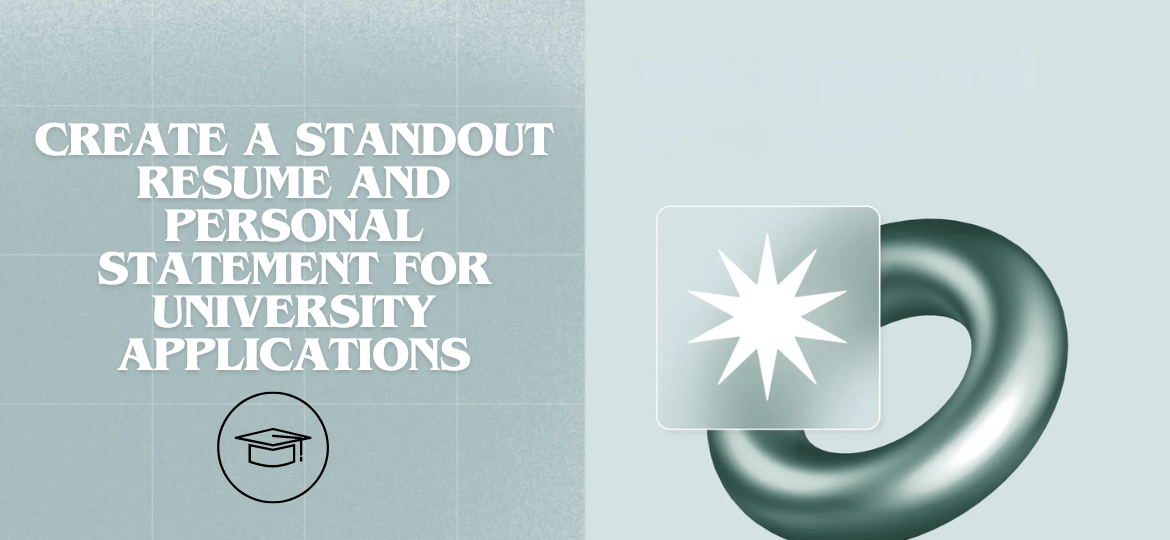


Studying abroad can be a life-changing experience, offering exposure to new cultures, languages, and academic environments. However, to secure a place in a university abroad, a strong resume and personal statement are crucial. This guide will walk you through the essential steps to create standout documents that will increase your chances of being accepted into your desired program.
Understanding the Importance of a Strong Resume and Personal Statement
Why a Standout Resume is Crucial
- First Impression: Your resume is often the first document admissions officers see. It needs to make a strong, positive impression.
- Showcase Achievements: A well-crafted resume highlights your academic and extracurricular achievements, relevant work experience, and skills.
- Demonstrate Fit: Your resume should clearly demonstrate why you are a good fit for the program and the university.
The Role of the Personal Statement
- Personal Insight: The personal statement offers a glimpse into your personality, motivations, and goals.
- Highlight Uniqueness: It’s an opportunity to explain what makes you unique and how your experiences have prepared you for studying abroad.
- Complement the Resume: While the resume lists your achievements, the personal statement provides context and depth to those accomplishments.
Crafting a Standout Resume for University Applications
Structure and Format
- Contact Information:
- Include your full name, phone number, email address, and home address.
- Make sure your email address is professional.
- Objective Statement:
- Write a brief statement about your academic and career goals.
- Tailor it to the program you are applying to, showing a clear connection between your goals and the program.
- Education:
- List your educational background in reverse chronological order.
- Include your school names, locations, dates of attendance, and degrees obtained or expected.
- Experience:
- Include any relevant work, internships, or volunteer experiences.
- Highlight your responsibilities, achievements, and the skills you developed.
- Skills:
- List any relevant skills, such as languages, technical skills, or soft skills.
- Awards and Honors:
- Include any academic or extracurricular awards.
- Extracurricular Activities:
- List any clubs, sports, or organizations you are involved in, especially those relevant to the program.
Content Tips
- Be Specific: Use specific examples and quantify your achievements when possible.
- Use Action Verbs: Start each bullet point with a strong action verb.
- Tailor to Each Application: Customize your resume for each application to highlight the most relevant experiences and skills.
Writing a Compelling Personal Statement
Structure and Content
- Introduction:
- Start with a compelling hook that grabs the reader’s attention.
- Introduce yourself and explain your interest in studying abroad.
- Body:
- Discuss your academic background and achievements.
- Highlight relevant experiences, such as work, internships, or volunteer work.
- Explain why you are interested in the specific program and university.
- Discuss your career goals and how the program will help you achieve them.
- Conclusion:
- Summarize your key points.
- Reiterate your enthusiasm for the program and studying abroad.
- End with a strong closing statement.
Writing Tips
- Be Genuine: Be honest and sincere. Admissions officers can tell when applicants are not being authentic.
- Show, Don’t Tell: Use specific examples to illustrate your points rather than making broad statements.
- Reflect: Reflect on your experiences and what you have learned from them.
- Edit and Proofread: Ensure your personal statement is free from grammatical errors and typos.
Additional Tips for a Successful Application
Research the University and Program
- Understand the Program: Know the curriculum, faculty, and any unique opportunities the program offers.
- Connect with Alumni: Reach out to alumni or current students to gain insights and advice.
Seek Feedback
- Ask for Input: Have teachers, mentors, or peers review your resume and personal statement.
- Professional Help: Consider seeking help from a professional resume writer or admissions consultant.
Stay Organized
- Keep Track of Deadlines: Make sure you know all the deadlines for your applications.
- Create a Checklist: Use a checklist to ensure you have all the required documents and information.
Tailor Each Application
- Customize Documents: Tailor your resume and personal statement to each program.
- Highlight Relevance: Emphasize the experiences and skills that are most relevant to each program.
Creating a standout resume and personal statement is essential for securing a place in a university abroad. By following these guidelines and dedicating time and effort to your application, you can increase your chances of success. Remember, studying abroad is a significant step towards achieving your academic and career goals, and a strong application is your first step towards making this dream a reality.
For further assistance or queries students can contact us, study abroad consultancy, and avail of our wide range of services for students on destinations like Study in USA, study in UK, study in Singapore , study in Switzerland , study in Australia, study in New-Zealand and many other countries.
FAQ
1. How long should my resume be for university applications?
A. Your resume should be one to two pages long, concise yet comprehensive enough to highlight your most relevant achievements and experiences.
2. What should I include in my personal statement?
A. Include your academic background, relevant experiences, career goals, and reasons for choosing the specific program and university.
3. Can I use the same resume and personal statement for multiple applications?
A. It’s best to tailor each resume and personal statement to the specific program and university to better demonstrate your fit and interest.
4. How important is it to proofread my application materials?
A. Proofreading is crucial; errors can leave a negative impression on admissions officers. Ensure your documents are error-free.
5. Should I include extracurricular activities on my resume?
A. Yes, include extracurricular activities, especially those that highlight your skills, interests, and experiences relevant to the program.



